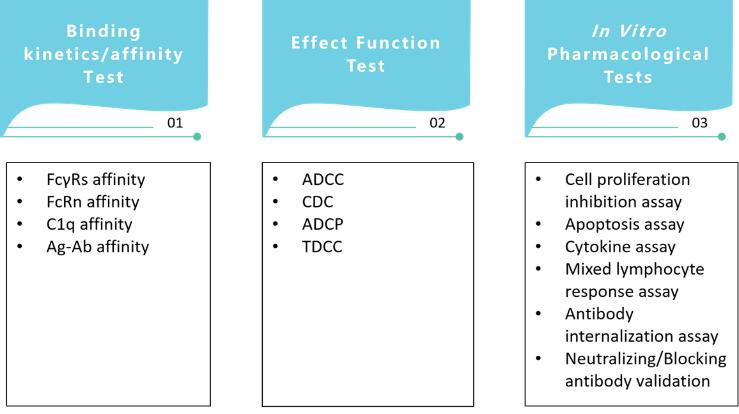Bioactivity Characterization
Online Inquiry
Activity assay is an essential part of the quality evaluation system of antibody drugs. Bioactivity assay is the determination of the active ingredient content and potency of an antibody drug, which is an important quality control indicator to ensure the effectiveness of antibody drugs. Creative Proteomics has established a complete system for the characterization of antibody drugs, including binding activity, cellular bioactivity, and immunoreactivity assay. Our powerful bioactivity characterization platform provides customized characterization solutions to accelerate your antibody drug development and submission.
Introduction to Bioactivity Characterization of Antibody Drugs
After completing the analysis of physicochemical properties, antibody drugs need to be fully characterized for their activity. Binding activity can directly reflect the antibody's ability to bind antigen, as well as its ability to bind to effector molecules/receptors, such as FcγRIII, C1q, and so on. On this basis, cytological bioactivity measurements, such as ADCC, CDC, cell proliferation inhibition, cytotoxicity, cytokine secretion, internalization, etc., make up a comprehensive characterization system for in vitro detection of antibody activity, which is the basis for in vivo experiments of antibody drugs and a guarantee of the success of the clinical experiments.
Antibody Drugs Bioactivity Characterization Services at Creative Proteomics
Creative Proteomics provides comprehensive antibody drug bioactivity characterization services with our advanced technology platform. Our services include but are not limited to the following:
Antibody drugs bind antigen through the CDR region of the Fab segment, and the Fc segment binds FcR, binds C1q, binds FcRn, etc., which is the basis for the antibody to exert its biological activity, and thus the determination of the binding activity of the antibody can partially reflect the activity of the antibody. Creative Proteomics employs a series of advanced techniques, including surface plasmon resonance assay, biofilm layer interferometry, time-resolved fluorescence and apha technology to accurately characterize the binding activity of antibody drugs.
Antibody drug bioactivity assays are based on the mechanism by which antibody drug bioactivity occurs. For example, CD20 antibody (e.g., Rituximab) binds to CD20 on the surface of expressed cells and kills target cells through effects such as ADCC, etc. Creative Proteomics has established different cellular activity assays to characterize the mechanism of action of different antibody drugs, including ADCC, CDC, ADCP, TDCC, etc.
In vitro pharmacological analysis validates antibody activity, explores the mechanism of action (MOA), and provides a foundation for drug IND filing. Our service is designed to match antibodies and targets, with experiment options such as flow-based, reporter gene, cellular analysis, and MSD, AlphaLISA, ELISA, Luminex, and other soluble protein analyses.

Creative Proteomics is committed to providing global partners with efficient and cost-effective solutions for characterizing the bioactivity of antibody drugs. Our customized solutions can effectively evaluate the effects of drugs and help customers shorten the time to enter clinical trials and market, while effectively reducing the cost of drug development and production. Contact us to learn more about our bioactivity characterization services of antibody drugs. We will be happy to serve you.

